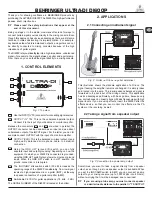
10
Blade doesn’t incorporate ingredients:
Butter or margarine, if not melted, must be cut into
tablespoon-size pieces before being added to work
bowl.
Metal blade rises in work bowl:
Blade may not have been pushed down as far as it
will go before processing started. Machine may be
overloaded. Stop it, remove half of dough and pro-
cess in 2 batches.
Motor stops:
See comments under “Typical Bread Dough.”
Dough doesn’t rise:
See comments under “Typical Bread Dough.”
PREPARING FOOD FOR SLICING
AND SHREDDING
Round fruits and vegetables:
Before processing onions, apples and other large,
round fruits and vegetables, trim them with a knife.
Cut the bottom end flat, to make the food lie stable
on the disc.
Place the food in the feed tube, flat side down.
Position it as far left as possible, to prevent it from
tilting when being processed.
Choose fruits that are firm and not too ripe. Always
remove large hard pits and seeds from fruits before
processing. Seeds from citrus fruits need not be
removed. You may remove the rind before slicing or
shredding, or leave the rind on.
Whole peppers are an exception:
Remove the stem and cut the stem end flat. Remove
the core and scoop out the seeds. Leave the end
opposite the stem whole, to keep the structure stiff.
This ensures round, even slices.
Large fruits like pineapple and cantaloupe:
Cut them in half and remove the seeds or core. If
necessary, cut the halves into smaller pieces to fit
the feed tube. Remember to cut the ends flat.
Cabbage and iceberg lettuce:
Turn the head on its side and slice off the top and
bottom, leaving a center section about 3 inches
deep. Remove the core and cut the center section in
wedges to fit the feed tube. Remove the core from
the bottom piece and cut it and the top piece into
wedges to fit the feed tube. The optional 2mm or
1mm Slicing Discs are excellent for slicing cabbage
for coleslaw.
If the fruit or vegetable doesn’t fit:
Try inserting it from the bottom of the feed tube.
The opening there is slightly larger.
Pack the feed tube for desired results:
For long slices or shreds, cut the food in feed tube
widths and pack the pieces horizontally.
For small, round slices or short shreds from carrots,
zucchini and other long vegetables, cut them in
feed-tube heights and pack them tightly upright.
Food should fit snugly, but not so tight that it
prevents the pusher from moving.
When slicing or shredding food, always use the
pusher. Never put your fingers or a spatula into the
feed tube.
Never push down hard on the pusher. Use light
pressure for soft fruits and vegetables like bananas,
mushrooms, strawberries and tomatoes, and for all
cheese. Use medium pressure for most food like
apples, celery, citrus fruit, potatoes and zucchini.
Use firm pressure for really hard vegetables like
carrots and yams.
PRACTICING SLICING
AND SHREDDING
1. Insert a slicing or shredding disc, put the cover on
the work bowl and insert the prepared food in the
feed tube.
2. Prepare the pusher assembly. Lock the small
pusher in place.
3. Slide the pusher assembly over the feed tube and
push the sleeve down to lock it into place. Apply
pressure to the pusher while pressing down the
OFF/PULSE lever. Release the lever as soon as
the food is sliced or shredded.
4. You can load the feed tube repeatedly without
removing the work bowl cover. Press firmly on the
tab and lift up. The pusher assembly will come off
easily, leaving the cover and feed tube in place.
Your other hand is free to reload the feed tube.
REMOVING SLICED OR
SHREDDED FOOD
Before you do anything, wait for the disc to stop
spinning. When it does, remove the cover first.
Lift, and the pusher assembly and cover will come
off together.
Remove the slicing or shredding disc before remov-
ing the work bowl. Place two fingers under each
side of the disc and lift it straight up. Then turn the
Summary of Contents for DFP-14N Series
Page 15: ...15 NOTAS...
Page 49: ...16 NOTAS...











































